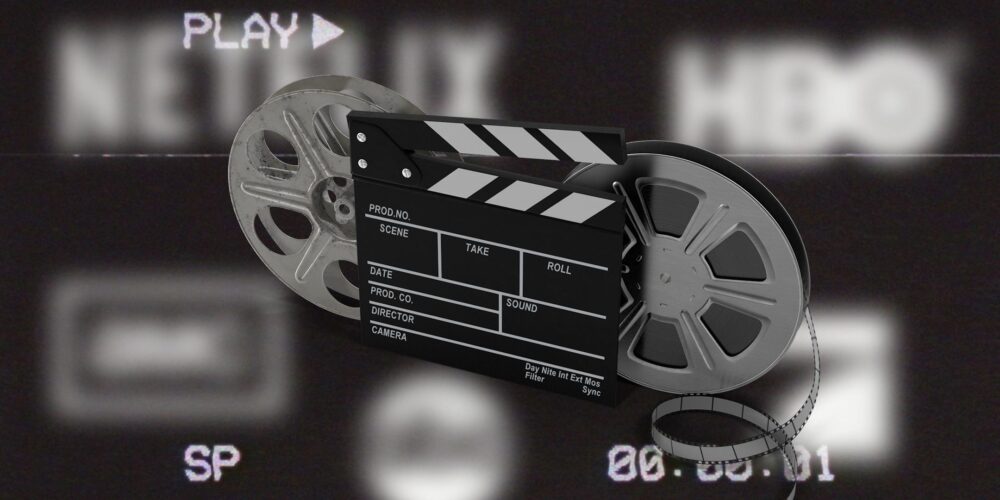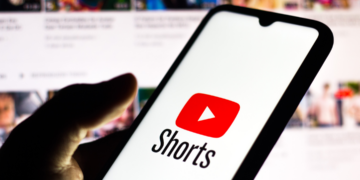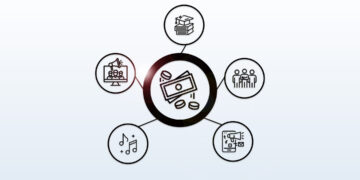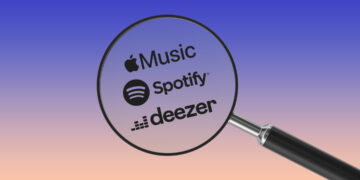What is sync licensing?

- What sync exactly means and how big this market is
- Which rights holders must give their permission
- What a sync agent is doing and what the advantages of collaboration are
- How much and in what way to earn with sync
Those of us who are interested in different sources of revenue for musicians are sure to have stumbled across the term “sync licensing.” But what’s behind the concept exactly? How do you secure a placement? And how do you make money from it? We’re here to shed some light on the matter.
In today’s day and age, musicians have to make use of many different sources of revenue. Most will nevertheless put their focus mainly on streaming services, social media, and perhaps some live shows. The fact that many are not entirely sure what sync licensing is, is precisely the reason why this income idea has often been overlooked. But with some luck, you can actually earn a significant amount of money from syncs.
The basics
Sync licensing (also known as “synchronization rights” or “sync rights”) refers to the licensing of music for various media such as TV, film, series, advertisements, or video games. A connection is essentially formed between a piece of music and visual media, which is known as synchronization. If someone wants to use your music for a film, for instance, they would need the permission of the rights owners, and pay a handsome sum for it, generally. In addition, the placement will widen the song’s and therefore also the artist’s reach.
Or, as our lawyer puts it in slightly more eloquent terms, “The right to couple music with visual media is a stand-alone economic good, which means the rights owner may demand compensation for the coupling process (synchronization) itself. Potential compensation sources therefore include all makers of audiovisual media, e.g., TV, film, series, advertisements, or video games.”
How big is the sync business?
Worldwide revenues from sync licensing currently amount to around 432 million USD per year. This is despite a 9.4% drop due to COVID. While the revenues from ads tend to decline due to advertisers having music specifically made for this purpose instead of licensing it, new opportunities have opened up in other areas of sync licensing. Some of these include fitness, wellness, and e-sports. Streaming providers such as Netflix or Amazon Prime have also shown an increased demand for music. Due to their international market, they are also seeking more and more music from different countries written in different languages. The demand for non-English music seems never to have been as big as now.
Who needs to be asked for permission?
Just like when you want to use a sample of a song, sync licensing, too, requires the permission of all rights owners, meaning the master owners as well as the publishing owners as well as any potential ancillary copyrights owners (especially when the original recording is used). Remember, the publishing rights are in the hands of the composers and lyricists of a song (or the song’s publisher). The master rights, on the other hand, are the rights to the recording and are either owned by the artists themselves or often by the record label. So, in order for a song to able to be used in a film, for instance, all rights owners must first give their permission.
If the song is a cover, then the artist is only in possession of the master rights. That means, in order for the song to be used, the songwriters and composers of the original song must agree to it, as well. That might sound complicated at first, but it is certainly worth a try, since covers are often licensed, especially when it is of a very famous song and the original would simply be too expensive to license.
The situation gets much more complicated, however, when your song contains samples which have not been cleared. Music supervisors pay very close attention to the ownership of the rights so that their clients will not be sued. Therefore, they are not likely to license a song containing uncleared samples. This is also the reason why most supervisors will only work with sync agents.
What does a sync agent do?
Of course, theoretically, it is possible to do the research yourself and find out who the music supervisors are that pick out the music for TV programs, series, or ads. But it will take enormous effort and making direct contact yields fairly slim chances of success. Sync licensing, just like many other areas in the music industry, is a people business, which is where sync agents and their contacts come into play. Sync agents, who can work independently for music publishers, record labels, or distributors, are the contact persons for music supervisors. When the music supervisors are looking for a song for a particular movie scene, for instance, the sync agents will propose different tracks that they think could fit. They will also proactively approach the supervisors and pitch songs from their repertoire. Last but not least, they will negotiate the price and take care of the administrative duties which are not to be underestimated. In exchange, they will, of course, receive a portion of the generated revenues.
Often, sync agents will ask for songs to be “pre-cleared” already. That pretty much means that you give them the right to negotiate deals in your name and that the permissions from all the rights owners are already at hand. This eases the negotiation process, and more importantly, makes it faster and less complicated. This is a factor that should not be underestimated, since today, things often need to get done quickly, and if there are too many issues that still need to be settled, the supervisor might decide to go with another song instead.
If you work with a sync agent, the cooperation doesn’t necessarily have to be exclusive. That means that you can deposit your song with multiple sync agents to increase your chances of getting a placement. But you should be careful, since different agents may offer the same song at different prices. And naturally, the supervisor will then choose the cheapest offer. Additionally, it can be exhausting for music supervisors to have the same song pitched to them multiple times.
Before you sign a contract with a sync agent, it is imperative that you verify them first with an expert (e.g., a music lawyer).
How much do you make from sync licensing?
In general, there are two ways to make money from sync-licensing your songs:
- An individual fee
- Revenues from a copyright collective
Individual fee
The individual, often one-time fee will in many cases be divided proportionately between the owners of the master and publishing rights. If you own all the rights, you will also get all the dough. You can also forego the one-time fee – for instance, if you allow a small film production without a real budget use your song. But even then, you should still receive compensation of equivalent value, such as sufficient exposure.
Copyright collectives
In some countries (for example Germany and Switzerland), producers of audiovisual media have the alternative option of acquiring the sync license directly from the copyright collectives. Examples include SUISA and GEMA, to which artists may hand over their sync rights for collecting purposes. So, as an artist, you need to decide whether you want to negotiate the individual fee yourself (or via a sync agent) or whether you want the copyright collective to handle the process. While the personal negotiation may yield higher monetary gain, licensing through a copyright collective could mean a higher chance of actually getting placed, precisely because of the lower licensing fee, especially when the client represents a smaller production. This decision is therefore very much a personal one. So, take a careful look at what your collection agreement says about sync licensing. Once you have handed over the rights to a copyright collective, in some cases, you may have no more influence over the precise use of your music. That means that a TV channel could use your song for a daily soap that you may not want your music to feature in.
Difference between sync licensing and use licensing
But even if your sync license isn’t handled by a copyright collective, it will still generate revenues. A sync license remunerates artists for the permission to create an audiovisual product in which their music is used. But on top of that, there is also the remuneration for the actual use (e.g., for TV, film, ads, games, etc.).
For example:
A film producer wants to add a specific song to the opening scene of their movie. To be able to do that (=creation), they need to pay a general license fee to the rights owners. This is the sync license.
If the film is picked up by cinemas, the operator must pay for another license to be able to show it (= actual usage). If the film is played on TV, the channels must equally acquire a license for the broadcast (= another actual usage), and so forth and so on.
That means that revenues can still flow via the copyright collectives when your song is broadcast on TV. This is comparable to the revenues generated when your song is aired on the radio, your music video is shown on TV, or your song is played in a bar or club. These revenues will be paid out accordingly by the copyright collective that you are registered with.
In some cases, everything is compensated with a one-time fee and the regular revenues through the copyright collective are dispensed with (however, this only applies if and as long as there is no relevant collection agreement made).
Let’s recap:
How much one effectively earns in a particular case can’t be predicted in exact numbers. In fact, it is always different for each placement and depends on numerous factors, such as:
- Which medium is used (usually, you will get more if your song is used in an ad than in a small film or a video game)
- Which territories the song is licensed for (worldwide or only specific countries)
- Whether the whole song is used or only a small part
- How long you grant the rights for (a specified timeframe or in perpetuity)
- Whether there are any limitations such as noncompetition clauses (for instance, if you hand a sync license to cellphone company A, you can’t then license the same song to cellphone company B)
- The music supervisor’s budget or their client’s
- The artist’s level of popularity
- The purpose for which the song is used – is it only played in the background or is it theme song of the film?
- The negotiation skills of your sync agent
So, it may very well be that the one-time fee only amounts to a few hundred Euros, but it is also not uncommon for Netflix, for instance, to pay a five-figure sum to a rather unknown artist. Ads and blockbuster movies may even spend six figures.
The sync market is known to be unpredictable. Sometimes, songs that you are confident in end up not getting used, while another track that you would never expect is chosen out of nowhere. So, you can’t really plan sync revenues into your budget, but when they do get paid out, you will definitely find yourself with some sweet extra income.
What else do I need to keep in mind?
- You should always keep track of who owns the master and publishing rights to your songs. Are the master rights yours or your label’s? Which songwriters were registered? If this still needs to be figured out, the deal might already be off the table.
- Find out whether your songs are registered with a copyright collective and in what scope it will assume and collect on your rights.
- Make sure that your songs don’t contain any samples that have not yet been cleared.
- Don’t just focus on your newest or most popular tracks. Music supervisors look for the most fitting songs, and these don’t necessarily have to be brand new or extremely well known. Sometimes, they want exactly the opposite. It is therefore best to make your whole catalog available to your sync agent.
- Make sure that you have instrumental versions or even individual audio tracks of your songs ready. Oftentimes, movies and ads will only use the instrumentals, because the lyrics might distract from the dialogue or simply don’t fit the content. Other times, the supervisor just wants the dreamy piano melody or the funky bassline. Having these ready at all times will definitely increase your chances.
Wider reach
Even though the revenues from sync licensing can be very lucrative, they are not the only benefit that come with placements. You know how it goes – you hear a song in a movie or even an ad and you immediately open Shazam afterwards. With the right placements, you have the opportunity to introduce your music to an entirely new audience through a different medium. Ideally, this can open new doors for you, as well. It is therefore only fitting to celebrate a successful placement on all your platforms and let everyone know about it.











